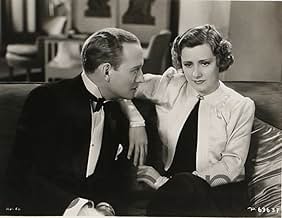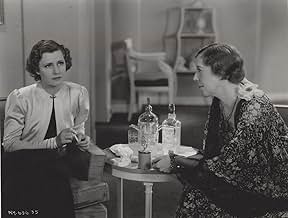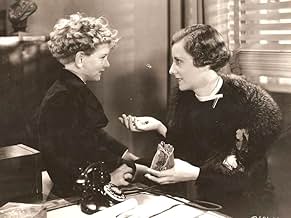Ajouter une intrigue dans votre langueA prison reformer and a controversial judge fall in love and have a child out of wedlock.A prison reformer and a controversial judge fall in love and have a child out of wedlock.A prison reformer and a controversial judge fall in love and have a child out of wedlock.
- Réalisation
- Scénario
- Casting principal
- Récompenses
- 2 victoires au total
J. Carrol Naish
- Dr. Sorelle
- (as J. Carroll Naish)
Rafaela Ottiano
- Mrs. Feldermans
- (as Rafaella Ottiano)
Wally Albright
- Mischa Feldermans
- (non crédité)
Margaret Armstrong
- Miss Jones
- (non crédité)
Irving Bacon
- Waiter
- (non crédité)
May Beatty
- Nurse
- (non crédité)
Avis à la une
It is doubtful if, at this point in time, anyone needs to be reminded of the consistent excellence of the versatile Irene Dunne, whose presence enhanced drama, comedy and musical films for many years. ANN VICKERS recalls to us how effective her subtle talent was even early in her career, playing a character alternately strong and vulnerable in a story too crowded with incident to give its major players the room they require to draw the characters fully. As a capable and resolute professional woman involved in social work and prison reform, Dunne's title character is curiously susceptible to the less-than-worthy men she finds more appealing than the steady earthbound types she encounters but does not favor. This contradictions accounts for a large part of the interest in her character, discreetly but firmly abetted by the nuances of yet another outstanding performance. Irene Dunne is perhaps the most reliable of all leading ladies. If you share the admiration of many for her work, this somewhat obscure picture will not disappoint you.
Lackluster romantic drama with feminist elements. Basically it's Irene Dunne spouting off about wanting to have her own career and being involved in relationships with douchebags. All of the success she has career wise is ultimately attributed to a man and the film's message seems to be that a woman's happiness only comes from the love of a man, so I really don't see where feminists are supposed to find much to love about this film. The brief middle part of the film dealing with the brutal goings-on at a women's prison are most interesting. They should've made an entire film of that. The rest is forgettable. The cast is fine. No standouts. Edna May Oliver is wasted, which is just criminal.
Ann Vickers (1933)
** (out of 4)
Static version of Sinclair Lewis' play has Irene Dunne in the title role of a social worker who gets dumped by an American soldier (Bruce Cabot) and then puts all her attention on her work. She eventually falls for a controversial judge (Walter Huston) but this here might cost her everything she's worked for. This RKO film was produced by Merian C. Cooper the same year he made King Kong but that's the only thing the two films have in common. Dunne is good in her role but the film is all over the place and it's easy to see that the film is trying to cover several parts of the book but can't take everything in within the short running time. Huston stays under control and gives a winning performance as does Cabot and Conrad Nagel in his supporting role. Edna May Oliver and J. Carrol Naish also have small roles.
** (out of 4)
Static version of Sinclair Lewis' play has Irene Dunne in the title role of a social worker who gets dumped by an American soldier (Bruce Cabot) and then puts all her attention on her work. She eventually falls for a controversial judge (Walter Huston) but this here might cost her everything she's worked for. This RKO film was produced by Merian C. Cooper the same year he made King Kong but that's the only thing the two films have in common. Dunne is good in her role but the film is all over the place and it's easy to see that the film is trying to cover several parts of the book but can't take everything in within the short running time. Huston stays under control and gives a winning performance as does Cabot and Conrad Nagel in his supporting role. Edna May Oliver and J. Carrol Naish also have small roles.
It seems ridiculous to us now that this was so controversial at the time and put the censors into a wild uncontrollable rage. Perhaps that's because it doesn't quite feel like an early thirties movie. The acting, the production and certainly the story seem much more modern.
Taken out of the context of its age, it's a fairly ordinary plot. There's no doubt it is extremely well made and but at the end of the day, it's just a story about an ordinary social worker. It's not something that you can get too excited about or want to watch again. Plenty of early thirties pictures are still entertaining as stand alone movies today - this however is one of those which is only interesting as a presentation of the morality, the attitudes, prejudices and constraints of the time.
Unlike some other "social injustice movies" of the time, this doesn't use an emotional sledgehammer to get its point across. Whilst that makes this feel more modern, if you love that old sensationalist approach such as used in NIGHT COURT or SAFE IN HELL you might find this a little bland and disappointing.
Taken out of the context of its age, it's a fairly ordinary plot. There's no doubt it is extremely well made and but at the end of the day, it's just a story about an ordinary social worker. It's not something that you can get too excited about or want to watch again. Plenty of early thirties pictures are still entertaining as stand alone movies today - this however is one of those which is only interesting as a presentation of the morality, the attitudes, prejudices and constraints of the time.
Unlike some other "social injustice movies" of the time, this doesn't use an emotional sledgehammer to get its point across. Whilst that makes this feel more modern, if you love that old sensationalist approach such as used in NIGHT COURT or SAFE IN HELL you might find this a little bland and disappointing.
9cng4
This is what a woman's film ought to be in this era, not just 70 years ago. The Ann Vickers character is a strong woman devoted to her career and to those who depend on her at the women's prison. She is not without her flaws as any hero or protagonist, but she overcomes so many obstacles and definitely has control over her life. What has happened to strong and complex female roles in modern motion pictures? This movie is well acted, well-written and has a tremendous message. I recommend it to anyone who can get their hands on it, as I believe it is still not available on video. It ranks up there with Norma Shearer's character Jerry in "The Divorcee" as far as a well-developed complex strong female characters. We need more movies depicting our gender this way not just as sex objects but as sexual subjects, with career goals and sex drives. Watch this movie!
Le saviez-vous
- AnecdotesSome objections were made by the Hays Office concerning the plot of the first draft of the screenplay, where Ann marries Captain Resnick and then has an affair with Barney. The plot was changed to Ann being seduced by the Captain with the offense somehow deemed less if only one of the parties in the adulterous affair is married. No reference is made about any abortion in the trip to Havana, and in the released print the cause of death of Ann's baby girl is never mentioned. RKO applied for an "Approved" certificate in 1935, when the production code was more rigorously enforced, but they were informed that no certificate would be given because of the film's attitude towards adultery.
- GaffesAlthough the first part of the picture takes place in 1918, all of Irene Dunne's hairstyles and clothes are strictly in the 1933 mode, and continue as such through the decade of the 1920s which follows.
- Citations
Barney Dolphin: [last lines]
Matthew Dolphin: Who are you?
Barney Dolphin: Well, son, i refuse to answer without advice of counsel.
- Crédits fousThe opening credits are printed in the pages of the novel. They are revealed by a man's hand opening the book and turning the pages.
- ConnexionsFeatures Her Man (1930)
- Bandes originalesSmiles
(1917) (uncredited)
Music by Lee S. Roberts
Lyrics by J. Will Callahan
Played by a band for dance music at the Lorlears Hook Settlement House
Whistled by Sam Hardy
Danced by Sam Hardy and Helen Cromwell and other couples
Meilleurs choix
Connectez-vous pour évaluer et suivre la liste de favoris afin de recevoir des recommandations personnalisées
Détails
- Date de sortie
- Pays d’origine
- Langue
- Aussi connu sous le nom de
- Sinclair Lewis' Ann Vickers
- Lieux de tournage
- Société de production
- Voir plus de crédits d'entreprise sur IMDbPro
Box-office
- Budget
- 303 000 $US (estimé)
- Durée1 heure 16 minutes
- Couleur
- Rapport de forme
- 1.37 : 1
Contribuer à cette page
Suggérer une modification ou ajouter du contenu manquant

Lacune principale
By what name was Ann Vickers (1933) officially released in Canada in English?
Répondre
































